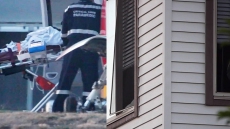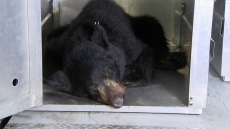VICTORIA — Andrew Meyer says he's chasing the future as he travels the world competing in drone racing events in what is one of the world's newest competitions.
The 26-year-old university student from Port Alberni, B.C., is known in drone flying circles as Andrew "MayMayDay" Meyer.
He's essentially grounded his education to fly drones at races in Canada, the United States, Dubai and South Korea, he said via Facebook on Friday from a highway rest stop near Seoul.
Meyer was one of 15 international drone racers invited to South Korea's Chuncheon Drone Race World Cup last weekend. About 100 South Koreans also entered in the event at the 20,000-seat Chuncheon city stadium.
He recently placed 10th at the 2016 U.S. National Drone Racing Championships in New York City and is entered in the Drone World Championship in Hawaii in October. He was a top competitor at Canada's Drone Nationals last year at Collingwood, Ont.
"I love trying new things," said Meyer who has done his share of bungee jumps and sky dives in the past. "The freedom of flight has always been interesting to me."
Drone racing started about four years ago, but it's only been in recent months where it's started to rise to prominence globally, with U.S. sports channel ESPN livestreaming the American nationals earlier this month and the World Drone Prix in Dubai offering $1 million in prizes.
It's all part of the fast-growing world of drone racing, where participants don goggles that are linked to the drone's camera, giving them a live, first-person view as they weave their small aircraft around a race course at top speeds.
"Anyone can put on goggles and feel exactly what the pilot's feeling," said Meyer. "You and thousands of people can be racing around the course through your drone. I think of drone racing as the better version of Formula One car racing."

Meyer envisions a future drone-racing circuit similar to Grand Prix auto racing.
He said racing drones takes more control skills than the everyday drones people use to explore their surroundings. Race drones are operated by successfully manipulating two joysticks that control speed and direction.
Most races involve about 10 drones that whiz through on-the-ground obstacle courses of sorts at speeds of more than 100 kilometres an hour. The winners are usually either the pilots who complete the most laps in a set time or the ones with the fastest three consecutive laps.
Meyer said he's hooked on drone racing and at the moment his quest for his master's degree in biomedical engineering is running a distance second in his life.
"When I started my master's at the University of British Columbia the drone racing was only starting to get big," he said. "It was just a hobby for me. It's a fine balance now between my master's and the drone world. Fortunately, my professor is very understanding of what I'm doing with drones."
Meyer said his university studies involve working with robotics to improve the accuracy of mobile X-ray machines used in orthopedic surgery.




